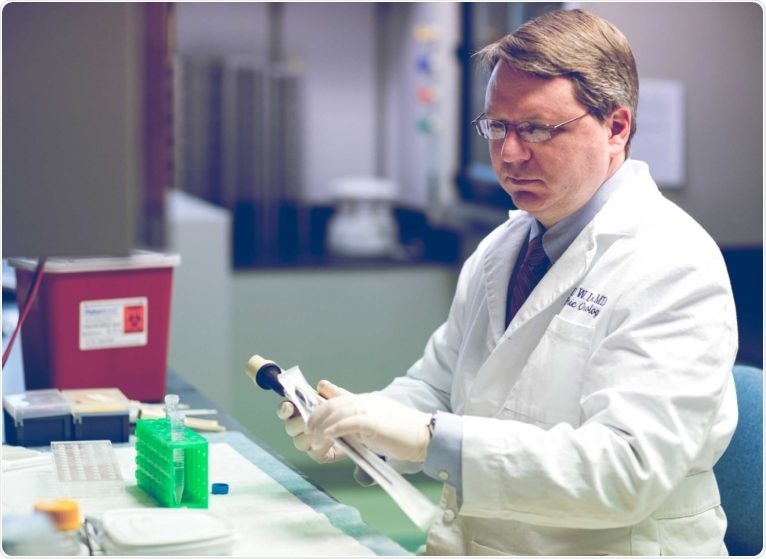Children and young adults who receive CAR T-cell therapy for the most common childhood cancer - acute lymphoblastic leukemia - suffer remarkably fewer relapses and are far more likely to survive when the treatment is paired with a subsequent stem cell transplant, a new study finds.

Daniel "Trey" Lee is conducting pioneering clinical research in the battle against childhood cancer. Image Credit: UVA Health
The research, with an average follow up of nearly five years, suggests that stem cell transplants offer long-term benefits for young patients who receive the cutting-edge immunotherapy. CAR T-cell therapy results in complete remission in 60%-100% of patients initially, but the relapse rate is high. However, among those who received a stem cell transplant after CARs, the relapse rate was less than 10% two years later.
More than 50% of kids in other studies with a different CAR relapse, with the majority of them losing the target the CAR goes after. Most of these kids have a single shot at this life-saving and paradigm-changing therapy called CAR T-cells. We should do all we can to maximize the chance for a cure, and right now that means a transplant after CAR therapy for most."
Daniel "Trey" Lee, MD, Researcher, Pediatric Oncologist and Director of Pediatric Stem Cell Transplant and Immunotherapy at UVA Children's and the UVA Cancer Center
About CAR T-cell therapy
Chimeric antigen receptor (CAR) T-cell therapy takes a person's own immune cells and genetically modifies them to make them more effective cancer killers.
The approach has shown high remission rates - up to 100% - 28 days after it is given to children and young adults with B-cell acute lymphoblastic leukemia. But a significant number relapse, the limited data available suggests. One study found that more than 40% had relapsed 13.1 months later.
To determine if stem cell transplants could help, the new study looked at outcomes in 50 children and young adults, ages 4 to 30. The median age was 13.5 years.
Among the 21 who received an allogenic stem cell transplant after CARs, only 9.5% had relapsed 24 months later. In comparison, all of those who did not receive a stem-cell transplant had relapsed.
Even as impactful as CAR T-cell therapy is for children with relapsed leukemia, we now know that the best outcomes happen when the child undergoes a stem cell transplant afterwards. Many parents turn to CAR T-cells to possibly avoid a stem cell transplant, and that is entirely understandable. But there is a window of opportunity after CARs to cure more of these incurable kids with a transplant; our study demonstrates this."
Daniel "Trey" Lee, MD
His hope for the future is for the field to be able to distinguish up front those who need a transplant and those who do not.
UVA Children's and the UVA Cancer Center offer several types of CAR T-cell therapies for both children and adults with leukemia and lymphoma.
Findings published
The researchers have published their findings in the Journal of Clinical Oncology. The research team consisted of Nirali N. Shah, Daniel W. Lee, Bonnie Yates, Constance M. Yuan, Haneen Shalabi, Staci Martin, Pamela L. Wolters, Seth M. Steinberg, Eva H. Baker, Cindy Delbrook, Maryalice Stetler-Stevenson, Terry J. Fry, David F. Stroncek and Crystal L. Mackall. Lee disclosed that he does consulting work for Harpoon Therapeutics and Juno Therapeutics and that UVA receives clinical trial support from Kite Pharma. A full list of disclosures is included in the paper.
The work was supported by the National Institutes of Health's Intramural Research Program, National Cancer Institute (grant ZIA BC 011498) and NIH Clinical Center, and by a St. Baldrick's/Stand Up 2 Cancer Pediatric Dream Team Translational Cancer Research Grant.
Source:
Journal reference:
Shah, N.N., et al. (2021) Long-Term Follow-Up of CD19-CAR T-Cell Therapy in Children and Young Adults With B-ALL. Journal of Clinical Oncology. doi.org/10.1200/JCO.20.02262.